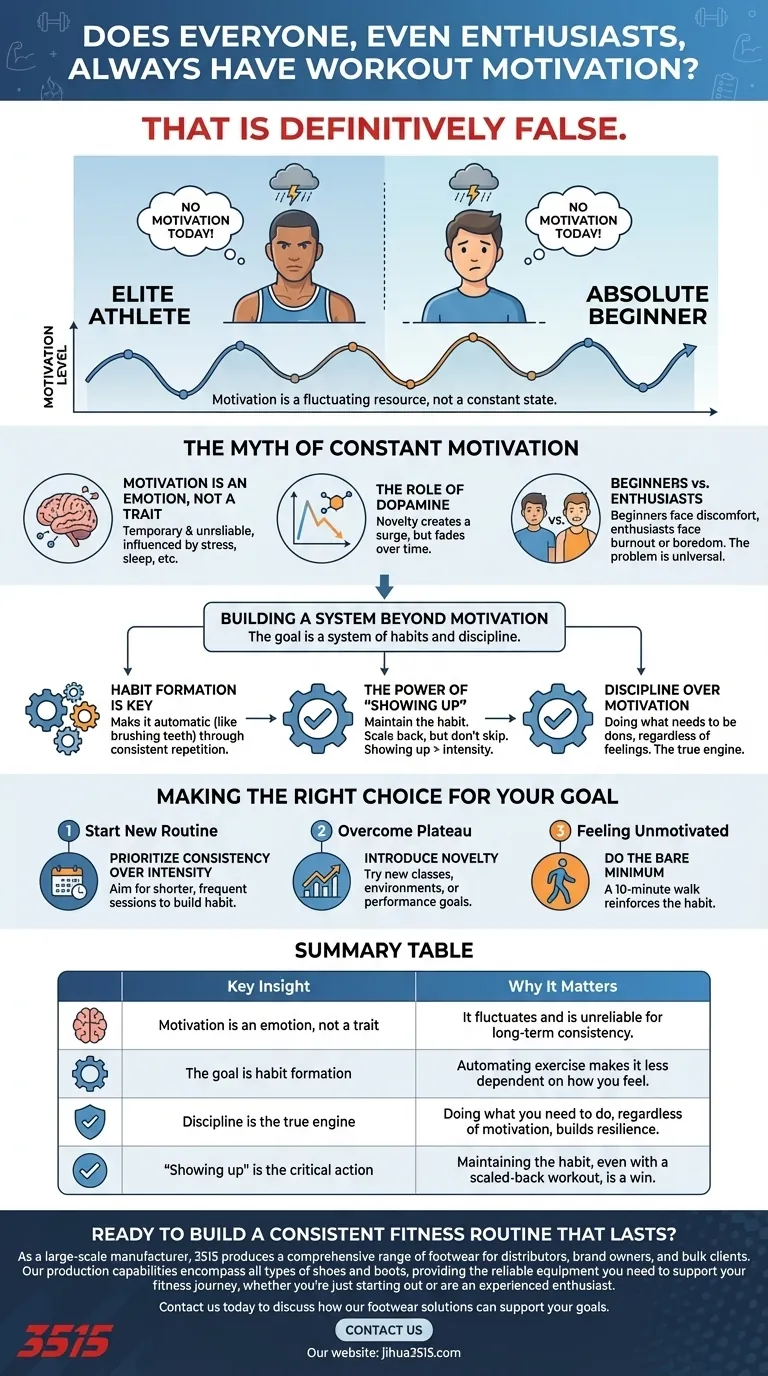That is definitively false. Everyone, from elite athletes to absolute beginners, experiences a lack of motivation to work out at some point. Motivation is not a constant state but a fluctuating resource that must be understood and managed, not simply possessed.
The core challenge isn't a lack of motivation, which is a normal human experience. The real goal is to build a system of habits and discipline that allows you to remain consistent even when motivation is low.

The Myth of Constant Motivation
Many people believe that "fit" individuals are always eager to train. This misunderstanding creates a cycle of guilt and frustration when their own motivation inevitably wanes. The truth is far more nuanced.
Motivation is an Emotion, Not a Trait
Motivation is a feeling, and like all feelings, it is temporary and unreliable. It can be influenced by stress, sleep, diet, and countless other external factors. Relying solely on feeling motivated is a recipe for inconsistency.
The Role of Dopamine
When we start a new fitness routine, the novelty and initial results can create a surge of dopamine, the "feel-good" neurotransmitter. This creates a strong sense of motivation. Over time, as the activity becomes routine, this dopamine response can diminish, making it feel less exciting.
Beginners vs. Enthusiasts
Beginners often struggle when the initial excitement fades and the physical discomfort of exercise becomes more prominent. Experienced enthusiasts face different challenges, such as burnout from overtraining, hitting performance plateaus, or simply becoming bored with their routine. The problem is universal; only the context changes.
Building a System Beyond Motivation
If motivation is unreliable, the key to long-term success is building a structure that doesn't depend on it. This is the fundamental difference between those who stay consistent and those who don't.
Habit Formation is Key
The goal is to make exercise an automatic behavior, much like brushing your teeth. You don't need to feel motivated to do it; you just do it because it's part of your routine. This is achieved through consistent repetition.
The Power of "Showing Up"
On days when motivation is zero, the most critical action is to simply show up. You can scale back the intensity, shorten the duration, or do a different activity. The act of maintaining the habit is far more important than the intensity of a single workout.
Discipline Over Motivation
Discipline is the act of doing what you need to do, regardless of how you feel. It's a skill that is strengthened every time you choose to train despite a lack of desire. This is the true engine of long-term fitness.
Making the Right Choice for Your Goal
Consistency is built on a foundation of discipline and habit, not on the fleeting feeling of motivation.
- If your primary focus is starting a new routine: Prioritize consistency over intensity. Aim for shorter, more frequent sessions to build the habit without causing burnout.
- If your primary focus is overcoming a plateau or boredom: Introduce novelty into your routine. Try a new class, exercise in a different environment, or set a new type of performance goal.
- If you are feeling completely unmotivated: Give yourself permission to do the bare minimum. A 10-minute walk is infinitely better than skipping your workout entirely because it reinforces the habit.
Ultimately, accepting that motivation will come and go is the first step toward building a truly resilient fitness practice.
Summary Table:
| Key Insight | Why It Matters |
|---|---|
| Motivation is an emotion, not a trait | It fluctuates and is unreliable for long-term consistency. |
| The goal is habit formation | Automating exercise makes it less dependent on how you feel. |
| Discipline is the true engine | Doing what you need to do, regardless of motivation, builds resilience. |
| "Showing up" is the critical action | Maintaining the habit, even with a scaled-back workout, is a win. |
Ready to build a consistent fitness routine that lasts?
As a large-scale manufacturer, 3515 produces a comprehensive range of footwear for distributors, brand owners, and bulk clients. Our production capabilities encompass all types of shoes and boots, providing the reliable equipment you need to support your fitness journey, whether you're just starting out or are an experienced enthusiast.
Contact us today to discuss how our footwear solutions can support your goals.
Visual Guide

Related Products
- Wholesale Durable Camo Canvas Shoes with High-Traction Rubber Soles
- Wholesale Customizable Suede Safety Boots - Puncture-Proof with Velcro Closure
- Customizable Slip-On Safety Shoes Direct from the Factory for Wholesale
- Wholesale Durable 6-Inch Work Boots | Custom & Private Label Manufacturer
- Durable Leather Work Boots Wholesale Manufacturer & Custom Factory
People Also Ask
- What organization sets national standards for workplace safety in the U.S.? OSHA's Role Explained
- How does ASTM differ from ANSI? Navigating the U.S. Standards System for Compliance
- What role do specialized outsoles play in preventing sports-related injuries for elderly athletes? Stay Safe on Court
- What is the purpose of ASTM International? A Guide to Global Quality Standards
- What are the advantages of high-performance non-slip outsoles in stroke rehabilitation? Enhancing Gait and Stability



















